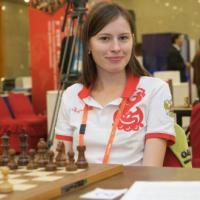
Must-Win Situations: Fear of Failure
Starting from today I would like to share with you some articles on chess psychology. This topic is relatively neglected in books, so most chess players have to learn by making their own mistakes and then corresponding adjustments to their behavior. In some situations the right way can be found, while in other cases the player may get stuck in their psychological problems for ages. Hopefully, these notes (based on my personal experience) will help you become stronger in the psychological sense and thus boost your results in both chess and life in general.
Must-win situations: fear of failure
As you might remember, during the Women’s European Chess Championship-2011 in Tbilisi I was forced into a situation where I needed 2/2 in the last two rounds to qualify for the World Championship. This is tough in both the chess and psychological senses. Not to mention that I had already been playing in a “must-win” mode for a few preceding rounds. In the end I succeeded, but nothing was granted in advance. I also made a serious mistake by becoming a victim of inner tension. I am sure you know what I am talking about: when your thoughts are running in a circle of “I must win” and “what if I fail?” This state of mind is quite harmful and energy-sapping. You can’t play your best, start over-checking your calculations, lose confidence.
To avoid that, one should remember the following. Life is non-linear, and you never know where a win or a loss may lead you in the future. It’s not like a win is always good, and a loss is always bad. Both outcomes are helpful if you are determined to move on and improve. Think about becoming stronger before the game. Believe in yourself and your ability to win. Keep in mind that each game makes you better. In this case there will be no inner tension, and your energy will be targeted on the game as opposed to useless worries. No matter what the tournament situation is, remember that you are playing chess because you love the game. Focus on what is happening on the board, not the possible life outcomes after a certain result.
In the game below, after the terrible move 33…Qe7 I somehow managed to get rid of my inner tension. Right after I made it, I saw that there was a win on the spot. This became a signal for me: it’s all about psychology, just relax and play. When I was younger and less experienced, this blunder would have probably devastated me and led to a loss. However, this time I managed to control my emotions and decided to start playing the game from scratch and, as a result, won an instructive bishop ending.
The tension that I failed to shake off during the championship resulted in a serious illness for me after its end. Keep in mind that negative emotions and being tense never goes unpunished. Sometimes an overemotional win may lead to serious problems, while a well-reflected loss may lead to great victories in the future.
Throughout all the game I had to play carefully and avoid simplifications that could lead to a draw. Sometimes that even led to taking risks and worsening my own position. The bishop ending that occurred is quite interesting. At first glance White seems to be doing ok, but in reality it is close to lost.






